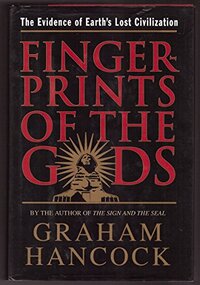Take a photo of a barcode or cover
I love a good conspiracy theory. Overall this book was a bit too long (I flipped through some of the more technical sections). I can’t vouch for the accuracy of all his claims, but at the very least I enjoyed learning more about the ancient civilizations and the congruence of ancient myths.
Heard on Audiobook. I couldn’t finish it. Terrible book. He goes no where, telling me nothing. It’s just ramblings about ancient Mexican cultures. He asks leading questions, or hints at ideas, then moves on. What a waste of a book.
A fascinating book which makes a convincing argument that human civilization dates back much further than is currently accepted by the academic community.
The first half (which deals with South and Central America)is more engaging than the second (which deals almost exclusively with ancient Egypt), but I found it all interesting.
The first half (which deals with South and Central America)is more engaging than the second (which deals almost exclusively with ancient Egypt), but I found it all interesting.
I loved this book! Very thought-provoking. It makes one question what we've been told.
To me, this reads like a cross between Thor Heyerdahl and Erich von Daniken. Hancock describes his travels and research over the course of five plus years which lead him to believe that an ancient human civilization has left signs for us of a coming cataclysm. I remember well the 1990s millennial panic into which this book was born. There were all kinds of books and TV history documentaries that seemed to stir these things up.
I don’t agree with all of the conclusions that Hancock makes but he presents a compelling narrative and questions that are fascinating to ponder.
I don’t agree with all of the conclusions that Hancock makes but he presents a compelling narrative and questions that are fascinating to ponder.
The first half of this book kept me entertained with the variety of theories showing the possibility of a civilized and technologically advanced civilization during the possible stone ages lost in time. Some of the coincidences surrounding myths all over the world brought a compelling case and the connecting factor of an incredible flood almost sold me, and wow was I impressed. Key word, "almost."
Now, I can't say I don't respect how much time and energy the author put into his theories and his writing. Someone's passion for their work and what they believe in is always a remarkable thing to see. However, halfway through this book (and after a quick Google search after some questionable "evidence") some of the wonderful questions about out prehistoric and ancient ancestors were answered with a string of ...less believable theories and unfavorable wording.
For starters, just because a nation has been labeled primitive does not make them mindless cavemen who needed saving and most importantly, couldn't think for themselves. The way the author speaks of different people's (Mayans, Egyptians, etc.) as if it were SO impossible their creations had been done completely by themselves and not through the helping hand of a "much more civilized" peoples is slightly insulting. Yes, I agree their knowledge of astronomy and their inventions seem impossible but why doubt them as we have for decades and centuries? Humans have gone to space, but couldn't look at the stars without a guiding hand?
Nevertheless, moving along and past all the theories that divine intervention was involved, the author posed some great questions about some of the world's biggest monuments and about the people behind the wonders. The fascination with the exactitude of a build or the determination of a people to survive a possibly massive event is enjoyable to read about. But the increasingly conspiracy theory sounding assumptions made near the end had me more confused than amazed.
And seriously, note to self, make sure an author is peer-reviewed next time. Maybe not questioning references or evidence would take a mental load off while reading. 3/5 stars.
Now, I can't say I don't respect how much time and energy the author put into his theories and his writing. Someone's passion for their work and what they believe in is always a remarkable thing to see. However, halfway through this book (and after a quick Google search after some questionable "evidence") some of the wonderful questions about out prehistoric and ancient ancestors were answered with a string of ...less believable theories and unfavorable wording.
For starters, just because a nation has been labeled primitive does not make them mindless cavemen who needed saving and most importantly, couldn't think for themselves. The way the author speaks of different people's (Mayans, Egyptians, etc.) as if it were SO impossible their creations had been done completely by themselves and not through the helping hand of a "much more civilized" peoples is slightly insulting. Yes, I agree their knowledge of astronomy and their inventions seem impossible but why doubt them as we have for decades and centuries? Humans have gone to space, but couldn't look at the stars without a guiding hand?
Nevertheless, moving along and past all the theories that divine intervention was involved, the author posed some great questions about some of the world's biggest monuments and about the people behind the wonders. The fascination with the exactitude of a build or the determination of a people to survive a possibly massive event is enjoyable to read about. But the increasingly conspiracy theory sounding assumptions made near the end had me more confused than amazed.
And seriously, note to self, make sure an author is peer-reviewed next time. Maybe not questioning references or evidence would take a mental load off while reading. 3/5 stars.
2nd read:
I picked this up again, because I was looking to do research for my next book... mostly just looking for inspiration. I downloaded the e-book version so that I could highlight relevant portions, and then listened via audio to the portions that didn't seem as important for my purposes. This time, I loved it!
Relevant for me were the beginning and the end primarily, with respect to the potential deep prehistory of Antarctica. Hancock made a compelling case that it was, essentially, the site of the lost island of Atlantis (though he never used that term that I can recall... but I do remember when I was researching how Plato described Atlantis while writing "The Atlantis Bloodline," the way Antarctica was described on the ancient maps sounds eerily accurate.) He then jumped to South America, and then spent a chunk of the book on Egypt, which was a repeat of the previous book I'd read by him that was entirely about Egyptology... there, he was making the point that a race of demigods had apparently visited the ancient peoples of our known civilizations, and left behind "fingerprints" in the form of unparalleled architecture with astrological purposes. Then he brought it home to the idea that this advanced civilization of demigods had actually come from Antarctica.
I disagreed with some of his fundamental worldview that shaped some elements of his conclusions, but for purposes of fictional research, none of that mattered. It was a fascinating and very helpful read.
_____
The concept started out fascinating, and I was especially intrigued by implications that there was once a very advanced civilization around 5000 years ago (which would fit with the biblical flood story quite well, though the author clearly had no intention whatsoever of implying this). But I was listening to it rather than reading, and I wasn't doing research for any particular project at the time, so I found that I just wasn't interested enough to listen to a whole book about it. I read a Graham Hancock book on Egyptology when I was writing "Invincible", and his alternative ideas were extremely useful for that, though, so I suspect I may revisit this in the future if I'm ever working on another project that requires conspiracy theories of ancient civilizations.
I picked this up again, because I was looking to do research for my next book... mostly just looking for inspiration. I downloaded the e-book version so that I could highlight relevant portions, and then listened via audio to the portions that didn't seem as important for my purposes. This time, I loved it!
Relevant for me were the beginning and the end primarily, with respect to the potential deep prehistory of Antarctica. Hancock made a compelling case that it was, essentially, the site of the lost island of Atlantis (though he never used that term that I can recall... but I do remember when I was researching how Plato described Atlantis while writing "The Atlantis Bloodline," the way Antarctica was described on the ancient maps sounds eerily accurate.) He then jumped to South America, and then spent a chunk of the book on Egypt, which was a repeat of the previous book I'd read by him that was entirely about Egyptology... there, he was making the point that a race of demigods had apparently visited the ancient peoples of our known civilizations, and left behind "fingerprints" in the form of unparalleled architecture with astrological purposes. Then he brought it home to the idea that this advanced civilization of demigods had actually come from Antarctica.
I disagreed with some of his fundamental worldview that shaped some elements of his conclusions, but for purposes of fictional research, none of that mattered. It was a fascinating and very helpful read.
_____
The concept started out fascinating, and I was especially intrigued by implications that there was once a very advanced civilization around 5000 years ago (which would fit with the biblical flood story quite well, though the author clearly had no intention whatsoever of implying this). But I was listening to it rather than reading, and I wasn't doing research for any particular project at the time, so I found that I just wasn't interested enough to listen to a whole book about it. I read a Graham Hancock book on Egyptology when I was writing "Invincible", and his alternative ideas were extremely useful for that, though, so I suspect I may revisit this in the future if I'm ever working on another project that requires conspiracy theories of ancient civilizations.
This would have made a great setting for a Tim Powers novel.
Thought provoking. Could it all be hokum and piffle? Nothing is certain but Hancock makes some valuable observations and raises intriguing questions. Whether he has the answers to them I leave to your judgement.




